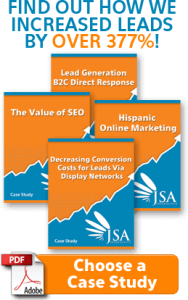When you’re looking to build a strong marketing foundation for your business, you need to be familiar with the basics. This week on the JSA blog, we’re going to dig deeper into B2B marketing tactics and concepts, so we’re going to kick things off with this installment of our rather aptly named “The Basics” series, wherein we’re going to cover an important question: “What is B2B Marketing?”
When it comes to any business, regardless of the products you’re selling or the services you’re offering, your company is going to fall into one of three general categories:
- B2G
- B2C
- B2B
“B2B” is a commonly used acronym that stands for “Business to Business.” You may also sometimes see it written out as “business to business,” or using other variations on the acronym itself, like “BtoB.” The term describes commerce between businesses, such as manufacturer to wholesaler or wholesaler to retailer, as opposed to B2C, which stands for “Business to Consumer,” and B2G, which stands for “Business to Government.” Generally speaking, there are more B2B transactions happening every day than there are B2C transactions, because while a retailer sells a finished product to a consumer once, a manufacturer may need to conduct multiple transactions with multiple other businesses in order to get the required parts to make that finished product. Further, while many B2C products and services could also be considered B2B, most B2B products and services will not be used by a single consumer.
And that means a B2B focused business must market with a focus on B2B.
So, What is B2B Marketing?
It’s simple: B2B marketing just refers to the steps one takes to sell one’s products or services to another business. B2B marketing is not like B2C marketing, which is the type of marketing most of us are most familiar with (soda commercials on TV, ads in fashion magazines, fliers from your local big box department store, etc), for a variety of reasons. While many of its hallmarks are the same, the buying process for a business is often very different from the buying process that a consumer in a retail environment will usually engage in. For example, if you want to sell a nice shirt to a consumer, all you need to do is convince that one person to buy it. If you are selling software designed for large corporations, however, you will likely find that there are multiple “buyers” involved in the process – IT managers, general managers, vice presidents, presidents, CEOs, and more – and you need to convince them *all* to buy.
There are other considerations, too. While a consumer may buy something on a whim or do some online research by reading reviews on sites like Amazon, a business will very rarely buy anything on a whim and will usually want to do in-depth research on your product before they even come close to committing to buy. And while flashy graphic design and fluff will often entice a single consumer, businesses are less swayed by those types of marketing tactics.
The Bottom Line
B2B marketing is about your business selling to another business, and requires a different mindset than you would otherwise use when marketing to a consumer (or the government). Stay tuned this week for more in-depth information on B2B marketing methods, tactics, and techniques to help get you started.
[single_callout/]













